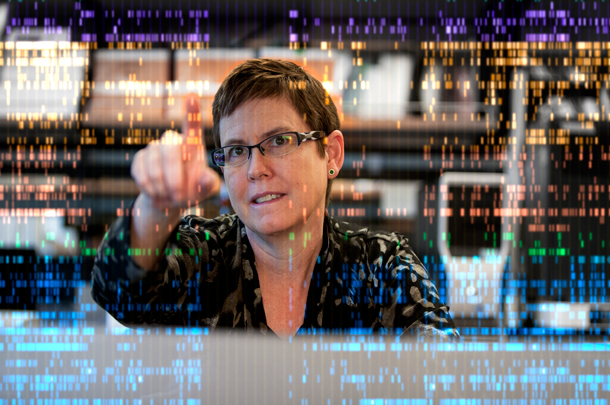Keck Medicine of USC researchers in the lab of Peggy Farnham, PhD, were key participants in the recent publication of a landmark collection of scientific papers related to mapping the DNA and histone modifications in human epigenomes and the ways that they coordinate the body’s biological activities.
Farnham is one of the leading experts in epigenetics, a field of study that seeks to explain how genes and life experience conspire to make us who we are. The epigenome is a series of chemical annotations to our DNA and associated proteins that determines whether, how and when genes are activated. These chemical changes determine normal development of the body, and disruptions in epigenetic control are involved in disorders from cancer to autism to heart disease.
Beginning in 2008, the Roadmap Epigenome Consortium set out to identify the cell type-specific regulatory elements in a large number of different human cell types, said Farnham, who is the William M. Keck Professor of Biochemistry and Molecular Biology and associate dean for graduate affairs at the Keck School of Medicine of USC. She has been part of the consortium since its inception.
The research, a culmination of years of work by hundreds of participants, was published online Feb. 18 by the journal Nature and six other journals under the aegis of Nature Publishing Group.
In all, the consortium of scientists simultaneously published 22 papers that represent the first comprehensive maps and analyses of the epigenomes of a wide array of human cell and tissue types. Farnham and her lab took part in a large integrative paper that was central to the project, plus additional papers in the set.
A unique contribution of Farnham’s lab was a paper that focuses on deleting a regulatory element to expand our knowledge of how genomic variation contributes to the risk of colon cancer. Follow-up efforts will expand the analyses to prostate cancer.
She said that publication of the epigenome mapping project has great significance in our understanding of how the epigenome modifies the genome, making marks that tell genes what to do and when to do it.
“One of the surprising findings that came from genome sequencing is that humans have about the same number of protein-coding genes as a microscopic worm,” Farnham said about prior research that formed the foundation upon which epigenome research is based.
“Only a small fraction of the human genome encodes proteins, suggesting that the large differences between our development and that of other, less complicated organisms is likely due to precise changes in the abundance of specific proteins, which is in turn controlled by regulatory elements that can be switched from inactive to active states,” she continued.
Unlike genes, which remain fairly stable during an individual’s lifetime, the epigenome is dynamic. Researchers are finding that the epigenome’s instructions can be altered by personal habits such as smoking or eating fatty foods. It also changes in response to experiences such as prolonged severe stress. Understanding why this happens is vital to the battle against disease.
“Understanding how genomic sequence elements regulate normal development and differentiation — and how variants in the genome contribute to human diseases such as colon cancer — are leading challenges of 21st Century medicine,” Farnham said.
Publication of the research was an undertaking in itself. More than a year ago, the consortium approached Nature to propose publication of papers that represented the culmination of the Roadmap Epigenome Mapping Project.
“Nature said they were willing to consider publication of a large set of papers,” Farnham said, “and everyone sent abstracts of their individual papers. Then the various Nature journals decided if they were interested in reviewing any of them.”
Papers that made the first cut then went through the journals’ normal editorial scrutiny process. “Not all of the submitted papers were accepted,” Farnham said. “The final 22 are the ones that made it the whole way.”
In all, Farnham and members of her lab took part in four of the 22 papers that were part of the Feb 18 package. Their paper that focused on colon cancer was published in Nature Communications. Farnham said that all the research described in that paper was performed here at USC.
The Farnham Lab is situated at USC Norris Comprehensive Cancer Center. Additional USC participants in the epigenome research were Research Specialist Heather Witt, PhD candidate Lijing Yao, PhD candidate Yu Gyoung Tak and Benjamin Berman, who at that time was an assistant professor in the Department of Preventive Medicine at the Keck School of Medicine of USC.
— Les Dunseith


